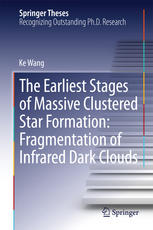

Most ebook files are in PDF format, so you can easily read them using various software such as Foxit Reader or directly on the Google Chrome browser.
Some ebook files are released by publishers in other formats such as .awz, .mobi, .epub, .fb2, etc. You may need to install specific software to read these formats on mobile/PC, such as Calibre.
Please read the tutorial at this link: https://ebookbell.com/faq
We offer FREE conversion to the popular formats you request; however, this may take some time. Therefore, right after payment, please email us, and we will try to provide the service as quickly as possible.
For some exceptional file formats or broken links (if any), please refrain from opening any disputes. Instead, email us first, and we will try to assist within a maximum of 6 hours.
EbookBell Team

4.0
36 reviewsThis thesis presents an in-depth, high-resolution observational study on the very beginning of the formation process: the fragmentation of dense molecular clouds known as infrared dark clouds (IRDCs). Using the Submillimeter Array (SMA) and Very Large Array (VLA) radio interferometers, the author has discovered a common picture of hierarchical fragmentation that challenges some of the leading theoretical models and suggests a new, observation-driven understanding of how massive star formation in clustered environments may begin: it is initiated by the hierarchical fragmentation of a dense filament from 10 pc down to 0.01 pc, and the stellar mass buildup is simultaneously fed by hierarchical accretion at similar scales. The new scenario points out the importance of turbulence and filamentary structure, which are now receiving increasing attention and further tests from both observers and theorists.